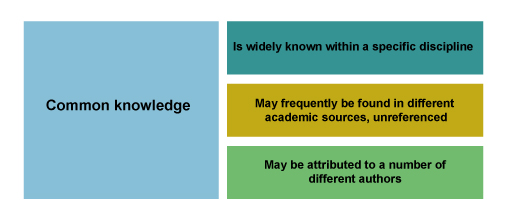1 What is common knowledge?
It is often stated that common knowledge does not need to be referenced. However, this raises the question over what is regarded as common knowledge.
A definition of common knowledge is surprisingly tricky – a broad definition would be ‘information widely known’. However, this in turn brings into question what is meant by ‘widely known’ and ‘by whom’.
When writing, it is important to keep your audience in mind:
- Common knowledge can be subject-specific: concepts and information that are widely known to an environmental scientist, for example, may not be widely known to an art historian, and vice versa.
- Common knowledge may also have a cultural element: beliefs, viewpoints and rules may not be the same across different cultural groups.
- Common knowledge also depends on the level of study: what might your audience already know? For example, if you are new to a subject area, you will have less knowledge and understanding about the topic than if you are an expert. The more experience you develop, the more your subject-specific language will develop – but, at the same time, you will also use more specific evidence from other people’s work to support your own work and ideas.
Figure 1 outlines how you might identify common knowledge.

